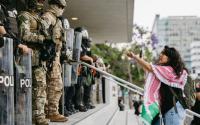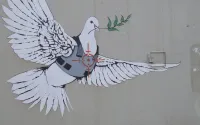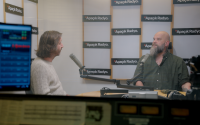Common Dreams / Published on Thursday, November 17, 2005 by the Cleveland Plain Dealer (Ohio)Elizabeth Sullivan
The Iraq war has come full circle.
As if the spectacle of U.S. senators rushing to cover posteriors over their earlier war enthusiasm weren't bad enough, now the Pentagon admits that earlier denials were wrong and it did use incendiary "white phosphorus" weapons in Fallujah.
White phosphorus bombs aren't banned, since they can create necessary illumination in battle. However, when used for chemical properties that burn on contact and keep burning when exposed to oxygen, they can be a horrific force for civilian terror. The allies' 1943 Operation Gomorrah firebombing of Hamburg took an estimated 37,000 lives.
That's why Protocol III of the 1980 convention on Certain Conventional Weapons prohibits the use of incendiary weapons against civilians. Among other things, the protocol - which the United States has not signed - bars the use of firebombs against military forces hiding among large concentrations of civilians. That would seem to encompass Fallujah, once a city of 300,000.
U.S. soldiers' own accounts of their actions at Fallujah support the use of "WP" - white phosphorus - to terrorize and flush out insurgents.
"We used it for screening missions at two breeches and, later in the fight, as a potent psychological weapon against the insurgents in trench lines and spider holes when we could not get effects on them" with high explosives, wrote three members of the 2nd Infantry's fire-support task force in a recent issue of the journal, Field Artillery.
Al-Jazeera television already is broadcasting horrific images of burned victims lifted from a recent Italian television documentary, "Fallujah, the Hidden Massacre," that alleged that women and children died from white phosphorus burns.
U.S. officials can deny for a year of Sundays targeting Fallujah's civilians, while Iraqi insurgents don't hesitate putting white phosphorus in their roadside bombs against civilians. Yet the damage is done.
Let's review:
The United States went to war citing Saddam Hussein's chemical weapons appetite as one excuse. Remember Paul Wolfowitz's comment to Vanity Fair interviewer Sam Tanenhaus: "The truth is that for reasons that have a lot to do with the U.S. government bureaucracy, we settled on the one issue that everyone could agree on, which was weapons of mass destruction as the core reason . . ."
The advertised large chemical weapons stockpiles, the "renewed production of mustard, sarin, GF (cyclosarin), and VX" nerve gas and the active atomic bomb program weren't there.
Saddam never used chemical weapons against U.S. forces. But now U.S. forces admit using weapons with chemical properties against Iraqis.
On Tuesday night, Lt. Col. Barry Venable, a Pentagon spokesman, confirmed to BBC radio that white phosphorus munitions were used during attacks on enemy forces inside Fallujah.
"When you have enemy forces in covered positions that your high explosive artillery rounds are not having an impact on," Venable was quoted in the Daily Telegraph newspaper of London, "one technique is to fire a white phosphorus round into the position because the combined effects of the fire and smoke will drive them out so that you can kill them with high explosives."
Venable added that such use of incendiary weapons "against enemy combatants" is a permitted use.
Venable apparently failed to brief others that the official line had changed.
"U.S. forces do not use napalm or white phosphorus as weapons," Robert Tuttle, former car salesman turned U.S. ambassador to Britain, wrote in Tuesday's Independent newspaper.
The United States has much, much more to do to sort out fact from fiction and tell the world exactly what happened. Truth matters, on this and other aspects of the march to war.
If this Congress and the Bush administration don't want to preside over a willy-nilly withdrawal from Iraq a la Saigon 1975, they better own up to the war's lies, manipulations and moral shortcuts, and devise a better plan - one more attuned to a war of ideas in the heart of Islam.
Elizabeth Sullivan is The Plain Dealer's foreign-affairs columnist and an associate editor of the editorial pages.






